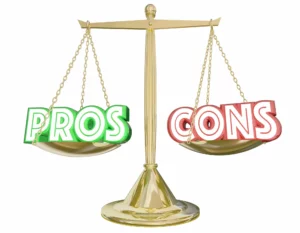As an experienced Dallas Family Law Attorney, I’ve had the privilege of witnessing the dynamics of mediation firsthand, both as a Mediator and as an attorney representing a party to the mediation. Mediation is a powerful tool in resolving legal disputes, offering both advantages and potential pitfalls.
The Pros of Mediation
The pros of mediation are abundant, and they play a pivotal role in shaping successful resolutions.

- High Success Rates: Mediation is remarkably successful in settling cases, especially when attorney mediators are involved. Whether it’s a two-party dispute or a complex multi-party case, the mediation process often leads to a satisfactory outcome for all involved.
- Attorney Involvement: Having skilled attorneys representing each party during mediation is crucial. Attorneys provide valuable advice, ensuring parties understand their rights, potential court outcomes, and the financial implications of their decisions. This informed approach enhances the likelihood of reaching a settlement.
- Convenience and Flexibility: The advent of technologies like Zoom has revolutionized mediation, making it more convenient and adaptable. This flexibility accommodates busy schedules and keeps the process moving forward.
- Partial Settlements: Not every mediation leads to a complete settlement, but that doesn’t mean it’s a failure. Sometimes, parties can agree on immediate matters while leaving more complex issues for court determination. This pragmatic approach keeps the process efficient.
The Cons of Mediation
While mediation has numerous benefits, there are some potential drawbacks that parties should be aware of before embarking on this journey.
- Lack of Legal Representation: Pre-filing mediations without attorney involvement can be less successful. Parties might lack a realistic understanding of their rights and potential court outcomes, resulting in an impasse or if settled, an unrealistic settlement.
- Prolonged Timelines: Mediation sessions can extend into long hours, occasionally even stretching into the late evening. Such extended sessions can lead to fatigue and potentially influence parties’ decisions based on exhaustion rather than clear judgment.
- Buyer’s Remorse: Occasionally, parties experience remorse after signing a mediated settlement agreement (MSSA). Once signed, these agreements are legally binding, underscoring the importance of thorough drafting and a comprehensive understanding of the agreement.
- Incomplete Resolutions: Mediations can lead to partial settlements or, in some cases, no agreement at all. When no resolution is reached, the matter is usually left for court determination, which can lead to delays and increased costs.
Having been an advocate for mediation and collaborative divorce from their inception, I firmly believe in the power of this process. Mediation provides a structured platform for parties to come together and find common ground. It’s an effective alternative to the adversarial nature of court proceedings.
While there are challenges, such as managing exhaustion during lengthy sessions and the risk of buyer’s remorse, these can be mitigated with careful guidance from experienced attorneys.
Mediation is a cornerstone of resolving family law disputes in Texas. It’s a process that empowers parties with informed choices, allows for creative solutions, and often results in successful settlements. If you’re navigating the complexities of family law, consider exploring mediation with the guidance of professionals who understand both its advantages and potential challenges.
For More Information Contact an Experienced Dallas Family Law Attorney
For more information or to schedule a consultation, contact Paula Lock Smyth Law Offices at 214-420-1800. Our office is located at 2911 Turtle Creek Blvd., Suite 300, Dallas, TX 75219.
Paula Lock Smyth has practiced law in Texas since 1985, focusing on Family Law, Probate, Mediation, and Collaborative Divorce. She is a trained mediator, seasoned litigator, and one of the early adopters of Collaborative Divorce in Texas. Paula is a member of the State Bar of Texas, the College of the State Bar and the Texas Bar Foundation and has served as Past President of Dallas Lawyers Concerned for Lawyers. She was a Master in the Annette Stewart Inn of Court and is a Charter Member of the Collaborative Law Institute of Texas. Her legal knowledge and decades of experience make her a trusted voice on matters that impact families across Dallas and surrounding counties.
